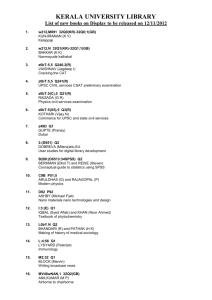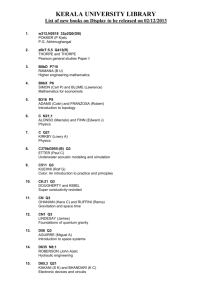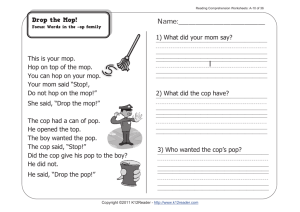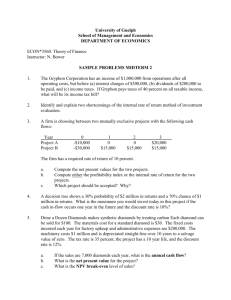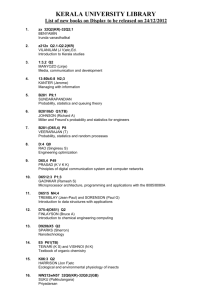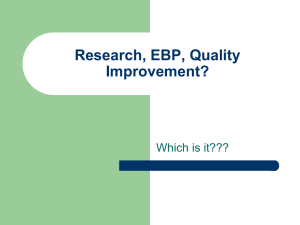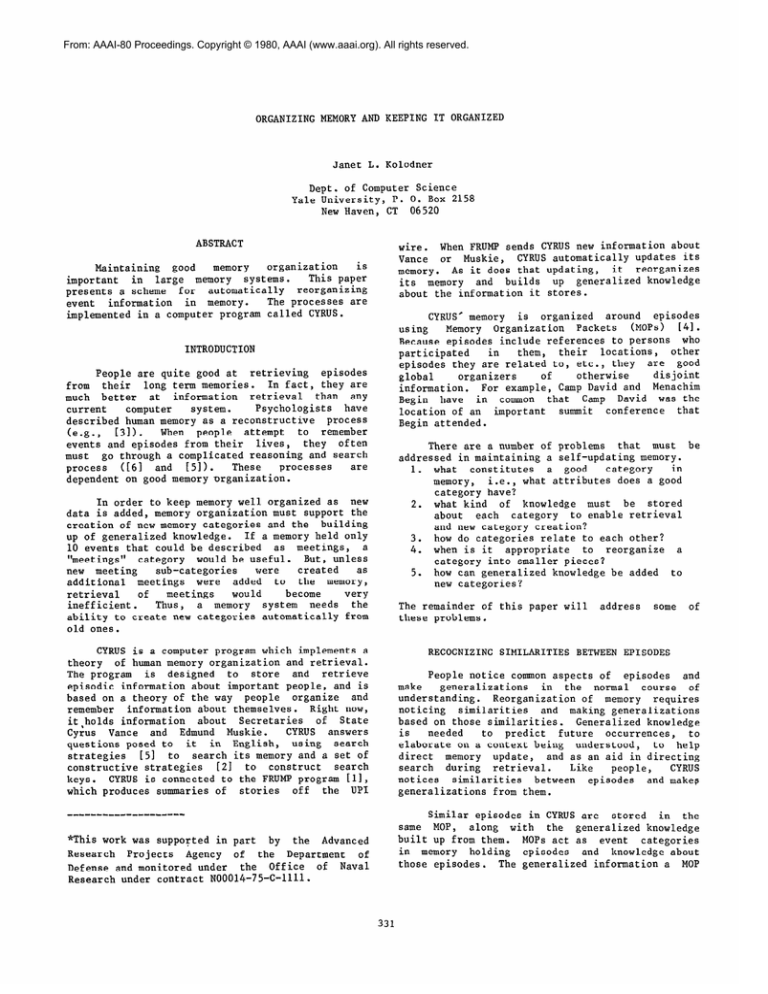
From: AAAI-80 Proceedings. Copyright © 1980, AAAI (www.aaai.org). All rights reserved.
ORGANIZING MEMORY AND KEEPING IT ORGANIZED
Janet L. Kolodner
Dept. of Computer Science
Yale University, P. 0. BOX 2158
New Haven, CT 06520
ABSTRACT
wire. When FRUMP sends CYRUS new information about
Vance or Muskie, CYRUS automatically updates its
memory. As it does that updating, it reorganizes
its memory and builds up generalized knowledge
about the information it stores.
organization
is
memory
Maintaining good
important in large memory systems. This paper
presents a scheme for automatically reorganizing
The processes are
event information in memory.
implemented in a computer program called CYRUS.
CYRUS' memory is organized around episodes
Memory Organization Packets (MOPS) [41.
using
Because episodes include references to persons who
participated
in
them, their locations, other
episodes they are related to, etc., they are good
disjoint
otherwise
of
organizers
global
information. For example, Camp David and Menachim
Begin have in common that Camp David was the
location of an important summit conference that
Begin attended.
INTRODUCTION
People are quite good at retrieving episodes
from their long term memories. In fact, they are
much better at information retrieval than any
system.
Psychologists have
computer
current
described human memory as a reconstructive process
(e.g., 131). When people attempt to remember
events and episodes from their lives, they often
must go through a complicated reasoning and search
are
processes
These
process ([6l and [51).
dependent on good memory Drganization.
There are a number of problems that must be
addressed in maintaining a self-updating memory.
category
in
1. what constitutes a good
memory, i.e., what attributes does a good
category have?
2. what kind of knowledge must be stored
about each category to enable retrieval
and new category creation?
3. how do categories relate to each other?
4. when is it appropriate to reorganize a
category into smaller pieces?
5. how can generalized knowledge be added to
new categories?
In order to keep memory well organized as new
data is added, memory organization must support the
creation of new memory categories and the building
up of generalized knowledge. If a memory held only
10 events that could be described as meetings, a
"meetings" category would be useful. But, unless
created
as
sub-categories were
new meeting
additional meetings were added to the memory,
very
meetings
would
become
retrieval
of
inefficient. Thus, a memory system needs the
ability to create new categories automatically from
old ones.
The remainder of this paper will
these problems.
CYRUS is a computer program which implements a
theory of human memory organization and retrieval.
The program is designed to store and retrieve
episodic information about important people, and is
based on a theory of the way people organize and
remember information about themselves. Right now,
it,holds information about Secretaries of State
CYRUS answers
Cyrus Vance and Edmund Muskie.
questions posed to it in English, using search
strategies [51 to search its memory and a set of
constructive strategies 121 to construct search
keys. CYRUS is connected to the FRUMP program [ll,
which produces summaries of stories off the UP1
address
some
of
RECOGNIZING SIMILARITIES BETWEEN EPISODES
People notice common aspects of episodes and
make
generalizations in the normal course of
understanding. Reorganization of memory requires
noticing similarities and making generalizations
based on those similarities. Generalized knowledge
is
needed
to predict future occurrences, to
elaborate on a context being understood, to help
direct memory update, and as an aid in directing
search during retrieval.
Like
CYRUS
people,
notices similarities between episodes and makes
generalizations from them.
Similar episodes in CYRUS are stored in the
same MOP, along with the generalized knowledge
built UP from them. MOPS act as event categories
in memory holding episodes and knowledge about
those episodes. The generalized information a MOP
*This work was supported in part by the Advanced
Research Projects Agency of the Department of
Defense and monitored under the Office of Naval
Research under contract NOOOl4-75-C-1111.
331
first time CYRUS hears about a meeting in which
Vance discusses mili tary aid, it will index that
meeting uniquely in the "diplomatic meetings" MOP
under the property "contract topic = military aid".
If it were also the first meeting he had with a
defense minister, then it would also be indexed
uniquely under the occupation of its participants
(because meetings are occupational).
holds resides in its "content frame" 141 and
includes such things as typical preconditions and
enablement conditions for its episodes, their
typical sequence of events, larger episodes they
are usually part of, their usual results, typical
location, duration, participants, etc.
The structure of individual episodes provides
a framework for deciding whether two episodes are
similar to each other. If, on two different trips,
Vance is welcomed at the airport and then has a
meeting with the president of the country he is in,
then the episodic structure of the two trips will
look alike, and we can say that the two episodes
are similar. While on the second trip, he might be
reminded [41 of the first one because of their
similarities. In the same way, a person hearing
about the two trips might be reminded of the first
when hearing about the second. If the result of
the first trip had been a signed accord, then he
may predict, or at least hope, that an accord would
If an
be signed at the end of this trip also.
accord is signed, he will generalize that when the
first event of a diplomatic trip is a meeting with
the head of state, then an accord will be reached.
Later, he will be able to use that knowledge in
understanding and retrieval.
If a property being indexed has occured once
before in a MOP (case 21, then reminding occurs,
the two events are compared to see which other
common aspects they have, and generalizations are
made. When Vance meets again about military aid,
CYRUS is reminded of the prior meeting because both
have the same topic. It checks the descriptions of
both to see what other similarities they have. If
both, for example, are with defense ministers, it
will conclude that meetings about military aid are
It also begins
usually with defense ministers.
indexing within the new MOP:
*Jr***********
Adding
SMEET actor (Vance)
others (defense minister of Israel)
topic (Military aid to Israel)
place (Jerusalem)
to memory ...
REORGANIZING EVENT CATEGORIES
Reminded of
SMEET actor (Vance)
others (defense minister of Pakistan)
topic (Military aid to Pakistan)
place (Washington)
In order for such reminding and subsequent
generalization to occur in CYRUS, its MOPS must be
highly structured internally. Episodes are indexed
in MOPS according to their important aspects.
Indexing in a MOP is by content-frame components
events, location,
includes
sequence
of
and
When an event is
participants, duration, etc.
indexed similarly to an event already in memory,
reminding occurs and generalizations are made based
on their similarities. As a result, a sub-MOP of
the larger MOP is formed to hold those episodes and
their generalizations. With the addition of more
episodes, new sub-MOPS are further divided.
In
creating new MOPS and building up generalized
information, new knowledge, which can be used for
later understanding and retrieval, is added to the
data base.
because both are "diplomatic meetings'
both have contract topic "military aid"
creating new MOP: meetings about military aid
generalizing that when
Vance meets about military aid,
often he meets with a defense minister
*****Jr*******
Later, if CYRUS hears about a third meeting
whose topic is military aid, it will assume that
the meeting is with the defense minister of the
country requesting aid (unless it is given contrary
information). If asked for the participants of
that event' i&w.'.11be able to answer "probably the
defense minister". If, on the other hand, a number
of meetings about military aid with participants
something other than defense ministers are added to
memory, CYRUS will remove that generalization and
attempt a better one instead.
The actual processing when an event is added
to a MOP depends on its relationship to events
One of the following four
already in the MOP.
things is true about each component of an event
description:
1. It is unique to this event in the MOP
2. It is semi-unique to this event in the MOP
(it has happened once or a small number of
times before)
3. It is often true of events in the MOP
4. It is typical of events in the MOP
On entering the next meetings about military
aid to memory, CYRUS will index them along with
other events already indexed there. A new meeting
military aid will be entered into the
about
"meetings about
military
aid"
sub-MOP
of
"diplomatic meetings" and will be indexed within
that MOP (case 3).
In this way,
reminding,
generalization, and new MOP creation will occur
within newly created MOPS. If a new meeting about
military aid to Pakistan is added to memory, CYRUS
will be reminded of the first because both will be
indexed under "contract sides = Pakistan" in the
"meetings about military aid" MOP.
In case 1, when the descriptive property is unique,
the event is indexed under that aspect in the MOP.
For instance, one of the discriminations CYRUS
makes on meetings is the topic of the contract
being discussed. A meeting about the Camp David
Accords is indexed under "contract topic = peace",
and a meeting about military aid- to Pakistan is
indexed under "contract topic = military aid". The
332
No discrimination is done on properties that
are typical (case 4) of events in a MOP (i.e.,
almost all events in the MOP fit that description).
way, generalization can control the
In
that
has
If memory
expansion of MOPS in memory.
generalized that meetings are called to discuss
contracts, then the fact that the topic of a later
meeting is a contract will never be indexed.
Appropriate aspects of the contract, however, will
be indexed.
Thus, if a new event with no unique aspects is
added to memory, reminding of individual events
does not occur, but generalizations already made
disconfirmed. Disconfinned
confirmed
or
are
When CYRUS hears
generalizations are removed.
about yet another meeting in the Mid East about the
Camp David Accords, it will not be reminded of any
specific episodes, but will put the new meeting
into the MOPS it fits into.
*Jr***********
Adding
SMEET actor (Vance)
others (Begin)
topic (Camp David Accords)
place (Jerusalem)
to memory ...
Putting it into MOP:
meetings with Begin in Israel
confirming generalizations
Putting it into MOP:
meetings about the Camp David Accords
with Israeli participants
confirming generalizations
Putting it into MOP:
meetings in Israel
confirming generalizations
a..
***Jr*********
Only those aspects of a MOP that are indexed need
be elaborated.
Generalized information can be used to answer
questions when more specific information can't be
found. If CYRUS has made a generalization that
in SALT
participant
usually
a
Gromyko
is
negotiations, it will be able to give the answer
"probably Gromyko" to "Last time Vance negotiated
SALT, who did he meet with?", even if it could not
retrieve the last negotiating episode. In the same
for
making
way, generalizations can be used
predictions during understanding.
CONCLUSIONS
Good memory organization is crucial in a large
Some important processes
information system.
memory organization must support include dynamic
reorganization of memory, creation of new memory
categories, and generalization. In this paper,
we've tried to show how a long-term memory for
episodic information can keep itself usefully
good
initial
organized.
requires
a
This
organization plus
rules
for
reorganization.
Reorganization of memory happens through reminding,
or noticing similarities between episodes, and
generalization. The generalizations produced are
useful
both
for
controlling
later
memory
Some related
reorganization and for retrieval.
problems which have not been addressed in this
paper, but
which are important, are updating
generalized knowledge (particularly recovery from
bad generalizations), judging the usefulness of new
categories, and guiding indexing properly so that
new
MOPS
and generalizations are useful and
relevant.
currently being
Those topics
are
addressed.
REFERENCES
[ll
IMPLICATIONS IN RETRIEVAL
What are the implications of this indexing
scheme in retrieval? The retrievability of an
event depends on how distinct its description is,
or how many of its features turn out to be
significant. As events with similar properties are
their common aspects lose
memory,
added
to
significance as good retrieval cues and category
An event with no unique or
specifiers (case 4).
semi-unique descriptors will become lost in memory
or "forgotten". Since events are indexed by their
differences, they can be retrieved whenever an
appropriate set of those differences is specified,
but specification of only common aspects of events
will not allow distinct episodes to be retrieved.
[21
[31
[41
during
Generalized knowledge can be used
retrieval in a number of ways. One important use
is in guiding search strategy application (see
151). Generalized knowledge can also be used for
search key elaboration. There is not always enough
information given in a question to direct search to
a relevant MOP or to a unique episode within a MOP.
Generalizations and a MOP's indexing scheme can be
used to direct the filling in of missing details.
151
[61
333
stories
in
DeJong, G. F. (1979). Skimming
real
time:
An experiment in integrated
understanding.
Report
#158.
Research
Science, Yale
Department
of
Computer
University.
Kolodner, J. L. (1980). Organization
and
Retrieval from Long Term Episodic Memory.
Ph.D. Thesis (forthcoming). Department of
Computer Science, Yale University.
Norman, D. A. and Bobrow, D. G. (1977).
Descriptions: a basis for memory acquisition
Center for
and retrieval. Report #7703.
Human
Information Processing, La Jolla,
California.
Schank, R. C. (1979). Reminding and
memory
organization:
An
introduction to MOPS.
Research Report #170. Department of Computer
Science, Yale University.
Schank, R. C. and Kolodner, J. L. (1979).
Retrieving Information from an Episodic Memory
Research Report #159. Department of Computer
Science, Yale University. also in IJCAI-6.
process
Williams, M. D. (1978). The
of
retrieval from very long term memory. Center
for Human Information Processing Memo CHIP-75,
La Jolla, California.

